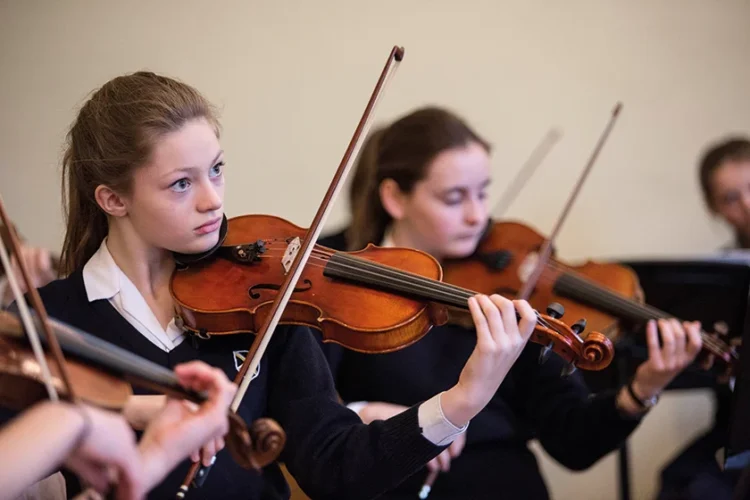By Gavin Mackintosh-
A recent report by Ofsted has highlighted significant variations in the quality and extent of music curriculum in the UK.
The report underlines concerns that many schools are not dedicating enough time and effort to ensure that pupils benefit fully from a rich education in music.
The findings of the report also brings to light a deficit in teaching pupils about the musical legends of old, such as Mozart and Beethoven, which could serve as a source of inspiration and educational value.
Ofsted’s research, which follows up on its 2012 report on music education, points to important strides made in primary schools. Today, nearly all primary school children have regular opportunities to learn music in reception, with weekly music classes in key stages 1 and 2.
The primary school curriculum has successfully emphasized teaching pupils to sing, representing a significant improvement in music education.
However, the picture becomes less promising as students transition to secondary school.
Ofsted’s research paints a concerning picture, revealing that a considerable number of secondary schools fail to allocate sufficient time for education in music.
In many cases, the curriculum time devoted to music in key stage 3 varies considerably, with nearly half of the schools failing to ensure that students receive the planned curriculum.
This insufficient allocation of time in secondary schools leaves pupils ill-prepared for more advanced musical studies.
Furthermore, most secondary schools do not capitalize on the progress and enjoyment that pupils experienced during their singing lessons in primary school, missing out on opportunities to foster a genuine passion for music.
Shifting Focus to Building Musical Proficiency
One of the key findings in Ofsted’s report is that schools with stronger musical curricular focus on teaching pupils not merely to “do” music but to “get better” at it.
These schools recognize the importance of imparting musical skills and knowledge to students, thereby enabling them to develop a genuine aptitude for music.
In contrast, weaker curriculums often result in students merely participating in music activities without achieving meaningful progress.
Many senior leaders in schools understand the pivotal role that extra-curricular music activities, both instrumental and vocal, play in complementing the curriculum.
However, as schools adjust to the return to normalcy following the disruptions caused by COVID-19, re-establishing these extra-curricular lessons remains a challenge.
Teachers, particularly in primary schools, have expressed a lack of confidence in teaching music, including their ability to demonstrate high-quality work to their students.
This highlights the need for comprehensive teacher training and support to ensure that educators are equipped to deliver high-quality music education.
Amanda Spielman, His Majesty’s Chief Inspector, acknowledged the positive steps taken by primary schools to prioritize music in their curricula.
However, she expressed concerns about the inadequacy of music education in secondary schools, calling for increased support for teachers to deliver a high-quality music education.
Spielman emphasized the need for school leaders and educators to use the report’s recommendations as a roadmap to develop robust music curriculums that effectively prepare students for further musical studies and a lifelong appreciation of music.
Recommendations for a Better Music Education
The Ofsted report presents several key recommendations to help schools ensure that all pupils receive a high-quality music education:
It calls for schools to support subject leaders in developing a curriculum that systematically and progressively teaches all students to become more proficient in music.
It also calls for the expansion of extracurricular activities to nurture musical talents and interests, alongside instrumental and vocal lessons
.Teachers are expected to continuously provide feedback to students to enhance their music-making skills, focusing on both technique and expressive quality.
Teachers should be offered opportunities for professional development to enhance their subject knowledge, including musicianship skills and a deeper understanding of high-quality music-making for students in their age group.
It also calls for schools should actively seek the support of local music hubs and other sources of expertise when developing and improving their music curricula.
A Broader Perspective on Music Education
While Ofsted’s report highlights the urgent need for improvements in music education across UK schools, it also highlights the disparity between the country’s approach and that of other nations.
Some countries have adopted a more comprehensive and broader approach to music education, exposing students to a wider range of musical genres, historical context, and legendary composers.
In contrast, the current UK curriculum often falls short in providing students with a comprehensive understanding of the rich history of music and the genius of legendary composers like Mozart and Beethoven.
A more robust and expansive curriculum could not only ignite students’ interest in music but also provide them with valuable cultural and historical knowledge.
A Call for Reform
The findings of Ofsted’s report serve as a wake-up call for the UK’s education system. While progress has been made in primary schools, secondary schools must redouble their efforts to ensure that music education is given the time and importance it deserves.
Additionally, the curriculum should be expanded to encompass a broader understanding of music, including the exploration of musical legends of old.
Schools in the UK can afford every child the opportunity to explore the wonders of music, from its historical roots to its boundless creative potential.
Through targeted reforms and a commitment to providing a holistic music education, British schools should aspire to become a leader in nurturing musical talent and appreciation among its young citizens.




